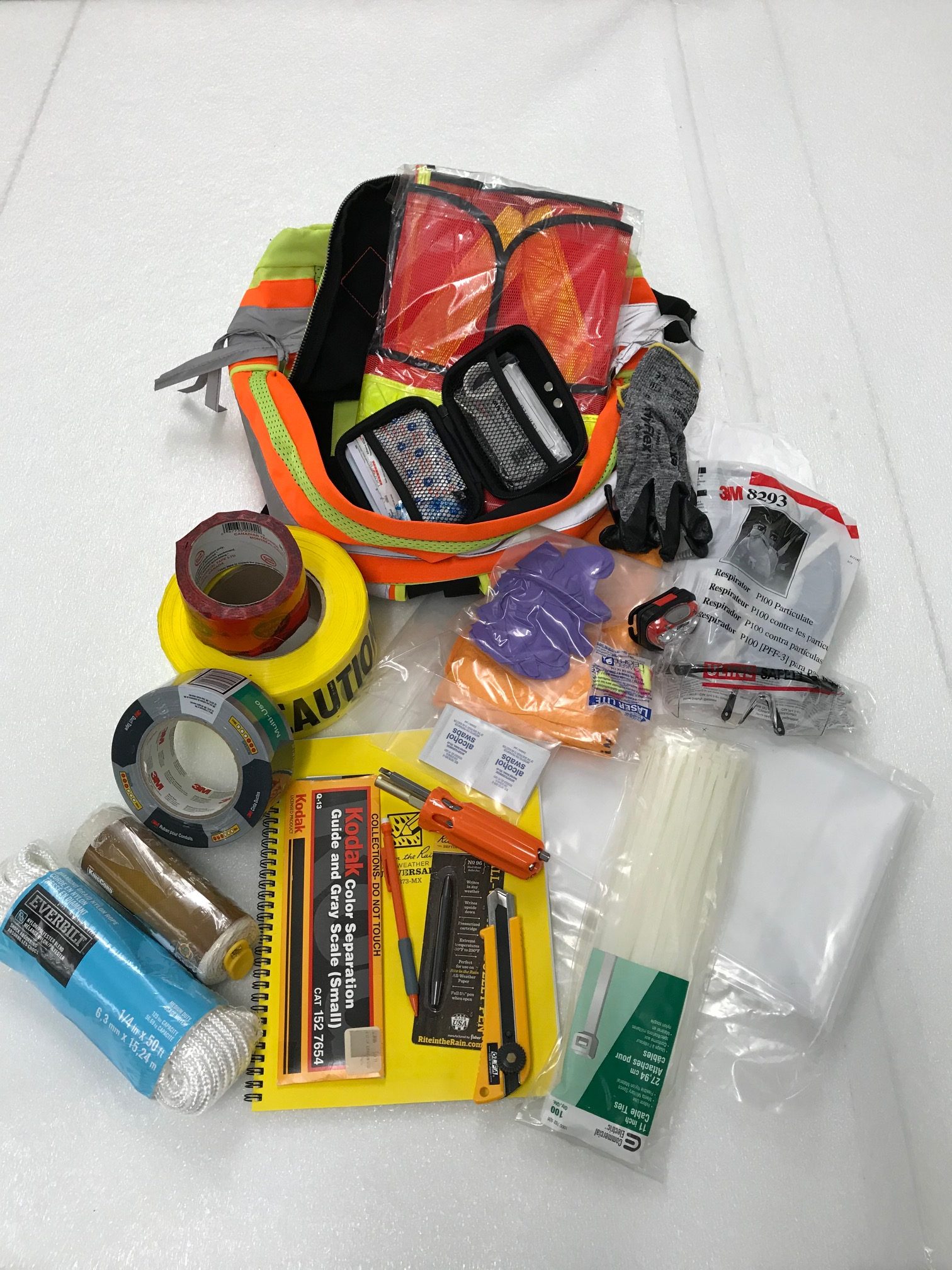Increase your knowledge by reading. Topics covered are Emergency Preparedness and Response, Salvage Techniques, Case Studies, Emergency Plan Templates, and Health & Safety.
Emergency Preparedness and Response
“Disaster Preparedness and Recovery: Resources for Archives” in Archives Society of Alberta website.
“Disaster preparedness and response” in Conservation on Line website.
Dorge, V. & Jones, S.L. Building an emergency plan: A guide for museums and other cultural institutions. Los Angeles: Getty Conservation Institute, 1999. Download free pdf from: www.getty.edu/conservation/publications_resources/pdf_publications/emergency.html
Help! An emergency preparedness manual for museums (edited by C. Willie). Edmonton: Alberta Museums Association, 2018. Order through: https://www.museums.ab.ca/book-store.aspx
Lord, A., Reno, C, and M. Demeroukas. Steal this handbook! A template for creating a museum’s emergency preparedness plan. Columbia, SC: Southeastern Registrars Association, 1994.
National Services Te Paerangi. Disaster Preparedness: Planning, Resourcing, and Stakeholder Collaboration. Wellington, New Zealand: National Services Te Paerangi, 2024.
“Preservation Leaflets: 3. Emergency Management” in Northeast Document Conservation Centre website.
“Response and Recovery Resources” in Smithsonian Cultural Rescue Initiative website.
Söderlund, K. Be Prepared: Guidelines for Small Museums for Writing a Disaster Plan. Canberra: Heritage Collections Council, 2000. Download free pdf from: www.history.org.au/Documents/beprepared.pdf
Salvage Techniques
“After Disasters: Salvage and Recovery in Small to Mid-Sized Museums and Libraries.” Connecting to Collections webinar registered 1 May 2015. | http://www.connectingtocollections.org/after-disasters/
“Conserv O Grams: 21. Disaster Response and Recovery” in National Parks Service website (scroll down to Series 21)
“Disaster Preparedness and Recovery: How-To Videos” in Archives Society of Alberta website.
“Emergency Salvage Procedures for Wet Items” from Minnesota Historical Society.
Endangered Heritage: Emergency Evacuation of Heritage Collections. Paris and Rome: UNESCO and ICCROM, 2016. |
https://www.iccrom.org/publication/endangered-heritage-emergency-evacuation-heritage-collections
First Aid for Art: Essential Salvage Techniques (edited by J.K. Hutchins and B.O. Roberts). Lenox, MA: Hard Press Editions, 2006. Now available as an E-book.
“First Aid for Water Damage” in National Film and Sound Archives of Australia (NAFSA) website.
Grønlund, Mari. “An evaluation of solid carbon dioxide (CO2) blasting as a cleaning method to remove soot from textiles after smouldering fire and fire, with the possibility to transfer the method to historical textiles within a museum context.” CeROArt, 2014.
Heritage Preservation Emergency Response and Salvage Wheel. | Order through: http://store.conservation-us.org/site/index.php?app=ecom&ns=prodshow&ref=FAIC-1
Field Guide to Emergency Response. Washington, DC: Heritage Preservation, 2017. | See videos at: https://www.culturalheritage.org/resources/emergencies/disaster-response-recovery/fieldguide
Image Permanence Institute. “A Consumer Guide for the Recovery of Water-Damaged Traditional and Digital Prints.” Rochester, NY: Image Permanence Institute, 2007.
Iraci, J. Disaster Recovery of Modern Information Carriers: Compact Discs, Magnetic Tapes, and Magnetic Disks. CCI Technical Bulletin no. 25. Ottawa: Canadian Conservation Institute, 2002.
Managing Disaster Risks. Paris: UNESCO, 2010. | http://icorp.icomos.org/wp-content/uploads/2017/10/Managing-Disaster-Risks-for-World-Heritage.pdf
“Preservation Leaflets: 3. Emergency Management” in Northeast Document Conservation Centre website.
Silverman, Randy, Miranda Bliss and Hal Erickson. “Comparing mass drying and sterilization protocols for water-damaged books.” International Preservation News, no 42, 2007, pp. 22–29 | https://www.ifla.org/files/assets/pac/ipn/ipnn42.pdf
Tandon, Aparna. First Aid to Cultural Heritage in Time of Crisis. Rome and Amsterdam: ICCROM and Prince Claus Fund, 2018.
“Treatment of flood damage of older and historic buildings.” Washington, DC: National Trust for Historic Preservation, Washington.
von Lerber, Karin. “Organizational tools for salvage operations” in ICOM-CC 17th Triennial Conference Preprints, Melbourne, 15–19 September 2014, (edited by J. Bridgland), art. 1515, Paris: International Council of Museums, 2014.
Walsh, B. “Salvage at a Glance.” WAAC Newsletter, vol. 19, no. 2, 1997, pp.12–23.
Walsh, B. Salvage Operations for Water-Damaged Archival Collections: A Second Glance. Ottawa: Canadian Council of Archives, 2003.
Case Studies
“Emergency Preparedness Videos” in Alberta Museums Association website.
Frost, Gary and Silverman, Randy. “Disaster Recovery in the Artifacts Fields – Mississippi After Hurricane Katrina.” International Preservation News, No 37, December 2005, pp. 35–47 | https://www.ifla.org/files/assets/pac/ipn/ipnn37.pdf
Spafford-Ricci, S. and F. Graham. “The Fire at the Royal Saskatchewan Museum, Part 1: Salvage, Initial Response, and the Implications for Disaster Planning.” Journal of the American Institute for Conservation, vol. 39, 2000, pp. 15–36 | http://cool.conservation-us.org/jaic/articles/jaic39-01-002_indx.html
Spafford-Ricci, S. and F. Graham. “The Fire at the Royal Saskatchewan Museum, Part 2: The Removal of Soot from Artifacts and Recovery of the Building.” Journal of the American Institute for Conservation, vol. 39, 2000, pp. 37–56 | http://cool.conservation-us.org/jaic/articles/jaic39-01-003_indx.html
Emergency Plan Templates
Canadian Conservation Institute (CCI). CCI Emergency Response Planning Workbook. Unpublished workshop training materials. Last updated in November 2018. For a copy contact: irene.karsten@canada.ca
“dPlanTM: The Online Disaster-Planning Tool for Cultural and Civic Institutions” in dPlan website.
“Emergency Preparedness and Response: Disaster Plan Template” in California Preservation Program website.
“Pocket Response Plan (PReP)™” in Council of State Archives website.
Health and Safety
“Mould Outbreak – An Immediate Response” in Canadian Conservation Institute website.
Guild, S. and M. MacDonald. Mould Prevention and Collection Recovery: Guidelines for Heritage Collections. CCI Technical Bulletin no. 26. Ottawa: Canadian Conservation Institute, 2004.

